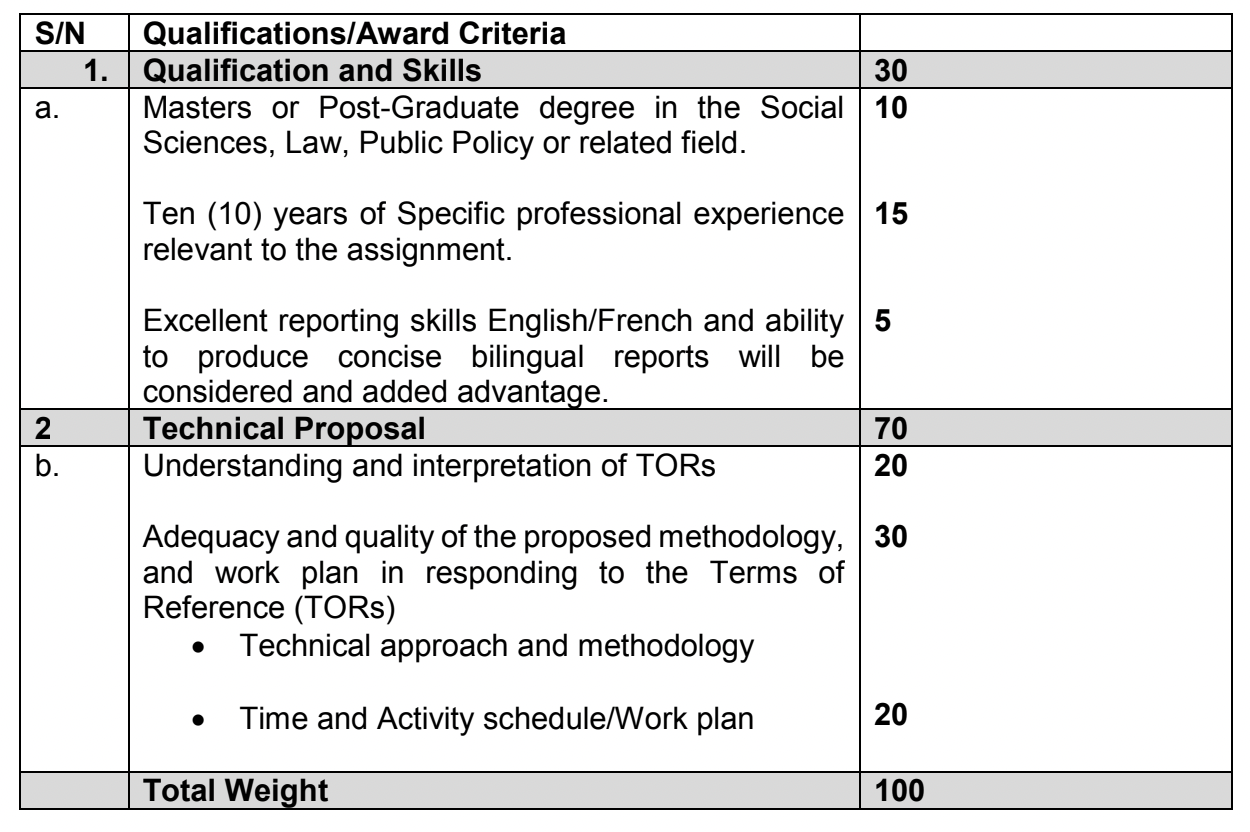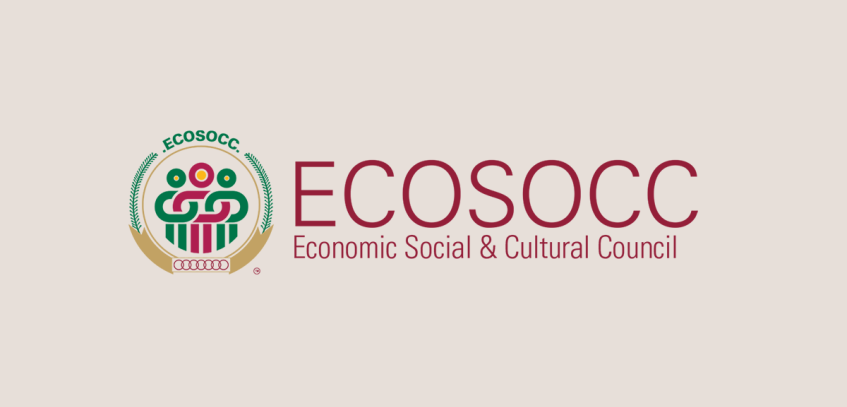Please refer to the TOR here, or access it via the download button towards the bottom of the page.
1.0 Background of the Assignment
The Economic, Social and Cultural Council (ECOSOCC) is an advisory organ of the African Union, established during the third Ordinary Session of the AU Assembly in Addis Ababa, Ethiopia in 2004 under the provisions of articles 5 (i) and 22 of the AU Constitutive Act. The organ is mandated to actively engage civil society in the processes and work of the Union, particularly with regards to Africa’s integration and development. ECOSOCC comprises various social, private sector and professional groups of member states of the union, and the African diaspora (Assembly/AU/ Dec.48 (III)) and functions primarily as a bridge through which the African Union can partner and engage with civil society organizations on the continent.
ECOSOCC’s mandate includes:
- Contributing, through advice, to the effective translation of the AU’s objectives, principles and policies into concrete programmes, as well as evaluating those programmes;
- Undertaking studies and making recommendations;
- Contributing to the promotion and realization of the AU’s vision and objectives;
- Contributing to the promotion of human rights, the rule of law, good governance, democratic principles, gender equality and child rights;
- Promoting and supporting the efforts of institutions engaged in reviewing the future of Africa and forging pan-African values in order to enhance an African social model and way of life;
- Fostering and consolidating partnership between the AU and CSOs;
- Assuming functions referred to it by other AU organs.
CSO members include but are not limited to:
- Social groups: e.g. those representing women, children, youth, the elderly and people with disabilities and special needs;
- Professional groups: e.g. associations of artists, engineers, health practitioners, social workers, media, teachers, sport associations, legal professionals, social scientists, academia, business organizations, national chambers of commerce, workers, employers, industry and agriculture, and other private sector interest groups;
- Non-governmental organizations (NGOs), community-based organizations (CBOs) and voluntary organizations;
- Cultural organizations;
- Social and professional organizations in the African Diaspora (in accordance with the definition approved by the Executive Council)
The African Diaspora is an integral constituency of the African Union and their participation in the Union is a fundamental institutional imperative. Article 3(q) of The Protocol on Amendments to the Constitutive Act of the African Union (2003) expressly invites the African Diaspora to participate as an important part to the building of the Union. Furthermore, the Declaration of the Global Diaspora Summit (2012) recognized the need to build sustainable partnerships between the African continent and the African diaspora through sustainable dialogue and effective collaboration with the governments and peoples of different regions of the world where the diaspora are located. In addition, Article 4(C) of the ECOSOCC Statutes stipulates that twenty (20) seats on the ECOSOCC General Assembly shall be reserved for civil society organizations in the African Diaspora, covering all regions of the world.
In its endeavour to enhance and improve the delivery of its mandate, ECOSOCC hereby invites technical proposals from qualified consultants to develop an institutional framework for the participation of civil society organizations from the African Diaspora in line with the relevant provisions of the ECOSOCC Statutes.
The consultant(s) will work with relevant stakeholders including (i) African Diaspora Networks from the various regions of the world, (ii) the Citizens and Diaspora Directorate of the African Union Commission (CIDO) (iii) ECOSOCC Structures including the General Assembly, Standing Committee, Credentials Committee, and the Secretariat. (iv) other Organs of the African Union who engage the African Diaspora in the execution of their mandates.
2.0 Objectives of the Assignment
The overall objective of this consultancy is to develop an institutional framework to guide the participation of African diaspora civil society organizations seeking to participate in the work of ECOSOCC.
The specific objectives of this consultancy will be to:
a) Develop a harmonized institutional framework, based on global best practice, for the participation of African diaspora civil society organizations in the work of ECOSOCC.
b) Design a harmonized mechanism with clear criteria for the election of African diaspora CSOs into ECOSOCC structures, including detailed election guidelines and modalities.
c) Develop parameters for diaspora participation in ECOSOCC meetings and events, including voting, quorum, and decision-making.
d) Develop the guidelines by which diaspora members may be elected to fill statutory positions within the ECOSOCC General Assembly, Bureau, and Standing Committee.
e) Facilitate a multi-stakeholder technical workshop, including via a dedicated online portal, with relevant stakeholders within the AU and the African diaspora to solicit their inputs for the development of the diaspora participation framework.
f) Develop a set of evaluation criteria for the periodic assessment of elected diaspora CSOs to ensure continuing compliance with eligibility requirements.
g) Design and lead project inception and validation workshops and submit associated reports.
3.0 Scope of the Services
The successful consultant will be required to carry out the following activities/tasks:
a) Undertake comprehensive consultations with relevant stakeholders in order to formulate clear criteria for the participation of African diaspora CSOs in the work of ECOSOCC;
b) Review the current practices that are considered as international best practices for diaspora participation in continental or multilateral organizations;
c) Identify the challenges and opportunities relative to the participation of African diaspora CSOs in the work of ECOSOCC; and formulate relevant proposals for effective diaspora engagement;
d) Develop the official framework document to guide the participation of African diaspora CSOs in ECOSOCC.
4.0 Transfer of Knowledge/Training
The consultant in liaison with the ECOSOCC Secretariat will organize a number of virtual fora, as required, to present the framework document and discuss the recommendations made and the action plan for their implementation.
5.0 Key Deliverables
The final deliverable of this consultancy shall be an Institutional Framework that provides a standardized mechanism for the participation of African diaspora civil society organizations wishing to participate in the work of ECOSOCC, including clear criteria and modalities for the election of diaspora representatives to ECOSOCC, as well as the specific parameters including rights, privileges, entitlements, duties, and responsibilities associated with diaspora participation in ECOSOCC.
6.0. Methodology
The consultant is expected to propose the preferred methodology for this assignment. However, due to the current dynamics with the COVID-19 pandemic, travelling will be restricted to the bare minimum and virtual meetings through Zoom platform are highly recommended. The consultant will use participatory and interactive methods, including use of online surveys, a web portal, e-administration of questionnaires, in-depth interviews, use of both empirical and secondary data.
7.0 Budget/Costs of Assignment
The total cost of this assignment shall be a fixed lumpsum of Fifteen Thousand United States Dollars (USD$.15,000.00)
8.0 Assignment Reports and Schedule of Submission
The consultant is expected to accomplish the task of the consultancy within the set timeline as follows:

9.0 Facilities, Services and Resources to be provided by the Client
The client ECOSOCC shall facilitate the use of a premium Zoom platform for the consultant to engage with the various stakeholders with sufficient notice. The client shall also submit a list of past and current General Assembly members, past ECOSOCC leadership and a repository of key AU decisions regarding ECOSOCC through its cloud- based server for the consultant’s reference.
The client will further facilitate communication with external stakeholders to bring to their attention the undertaking of the exercise; this will include preparation and administration of introduction letters as well as pass/passes for the consultant where necessary. In the eventuality, physical meetings are required between ECOSOCC and the consultants in the course of the assignment; the client will facilitate it in entirety (venue, stationery and equipment).
10.0 Assignment Period
The consultant is expected to undertake this assignment within a period of fourteen weeks after signing of the contract. The consultant shall provide a breakdown (Gantt Chart) of the period within which the various activities for this assignment are expected to complete within the specified time frame.
11.0 Assignment Management & Administration
11.1 This assignment will be managed by the ECOSOCC Secretariat, in collaboration with AU Citizens and Diaspora Directorate. This includes servicing the consultant, support with setting-up appointments with stakeholders, ensuring that payments are made on time, facilitating meetings and tracking the work plan of the consultant.
11.2 Desk Officers of the Secretariat will be assigned to help in increasing expert opinion in the process. The consultant will also report to the designated focal point on all matters pertaining to the assignment.
12.0 Documents for Review
All relevant policy related reports of the commission and ECOSOCC
13.0 Selection Criteria and Qualifications
The consultant to undertake the assignment is expected to have the following qualifications and competencies:
Qualification of the Consultant(s)
Masters or Post-Graduate degree in the Social Sciences, Law, Public Policy or related field.
Experience
The consultant to undertake the assignment is expected to demonstrate experience in:
1. Ten years’ experience in Developing policy or research pertaining to the role of civil society actors within an institutional context, preferably at the multilateral level;
2. Demonstrated experience in the development policy or research frameworks pertaining to the role of diaspora in development;
3. Designing, conducting and authoring high-quality academic and/or scientific research preferably within a university or research institute context;
4. Familiarity with the African Union and its modus operandi;
5. Proven experience in the development of strategy papers or publications for major institutions, preferably at regional or continental level;
6. A good understanding of the AU-ECOSOCC and its mechanisms will be an asset;
7. Based on the African continent or within the African Diaspora;
8. Civil society experience and linkages, within an African context, will be considered an asset;
9. The consultant must represent a diversity of methodological skills, stakeholder networks, disciplinary backgrounds, and demonstrable expertise in the delivery of implementable policy recommendations in the continent, as well as a strong background in development and policy in Africa.
10. Sound interpersonal and communication skills required.
11. Excellent presentation skills are required both orally and in writing
12. Working knowledge of English or French (written and spoken) Knowledge of the two is an advantage
13. Ability to work as part of a team in close collaboration with international stakeholders is required.
14.0 Travel Requirements
The assignment will be 80% home based and 20% travel to conduct the face-to-face and consultative interactions with the relevant stakeholders. Travel will only be approved if there is a motivated reason where virtual engagements are impractical or insufficient. In any eventuality, that the Secretariat feels the need to have an in-person working session with the Consultant or any other travel requirements; a DSA (daily substance allowance) and economy class travel ticket will be covered by the former in accordance with AU rules and regulations.
15.0 Selection Criteria and Qualifications

Minimum technical score is 70 points. Consultants will be selected under the fixed budget selection method where the consultant who has submitted the highest ranked technical proposal within the set pass mark and within the budget will be selected for award of contract.
Further information can be obtained at the addresstender@auecosocc.org; ECOSOCC@africa-union.org and/or Musembij@africa-union.org





